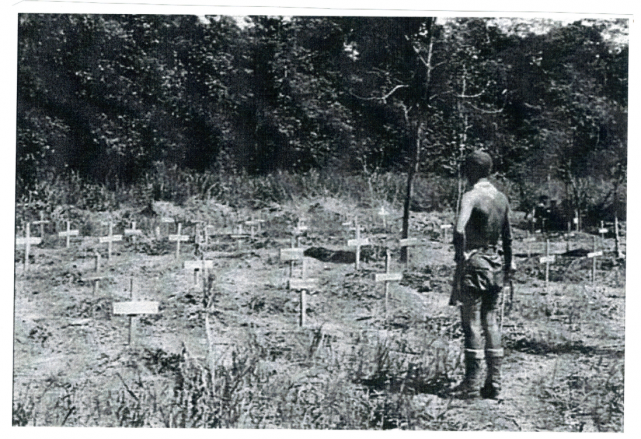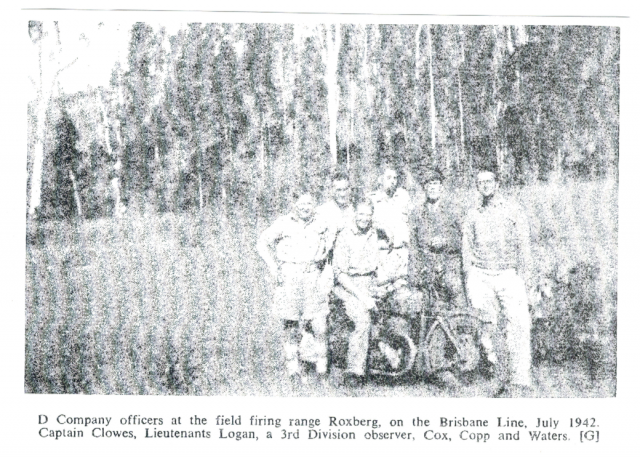By John Telfer
Each evening from sunset to sunrise, at the Australian War Memorial in Canberra, up to 1,200 names from the Roll of Honour are projected onto the façade of the Hall of Memory. This daily Commemorative projects one Australian soldier who has died in the Great War onto the wall and on January 28th 2020, at 10.56pm, former Warwick man Captain Trevor Marcel Clowes, will receive this honour. Here is Trevor’s story.
Trevor was born on 4th September 1918 as the youngest son of Albert and Louise Annabel Clowes of Locke Street Warwick. He was born into a military family with his two older brothers, Cyril and Norman, entering the Royal Military College at Duntroon among the first cadets to be enrolled in 1911. Trevor being much younger than his two older brothers idolised them and really wanted to follow in their foot- steps, which he eventually did many years later. His father, Albert Clowes, a local dentist, was a Lieutenant-Colonel and Commander of the 14th Australian Light Horse.
Trevor received his early education at Warwick Central School and later, at Warwick State High School where he was a brilliant scholar and a member of the High School Cadet Corps in his time there. With his family’s military background, Trevor only wanted a career in the army like his two older brothers, so applied to the Royal Military College at Duntroon just as his brothers did, and was accepted in 1937. This received a mention in the Warwick Daily News when it said:
“Advice has been received by Mr and Mrs A.E.Clowes, that their
youngest son, Trevor, has been selected to enter the Royal Military
College, Duntroon. In adopting the Army as his career, Trevor Clowes
is following the family tradition set by his father and two brothers”.
He had a brilliant career at Duntroon and on completion, was posted back to the Southern Downs Light Horse Regiment in Warwick.
When World War 2 broke out in 1938, Trevor was keen to get into the action and enlisted on 20th May 1940 as a soldier, when he transferred to the 2nd Australian Imperial Force. He was quickly promoted to Lieutenant and posted to the newly formed 2/33 Battalion, Seventh Division, and saw action in the Syrian campaign. In 1941, the battalion carried out garrison duty before fighting with the Vichy French in both Syria and Lebanon. In 1942 the battalion returned to Australia for further training and rest, before being deployed to New Guinea in early 1942.
The New Guinea campaign was a lot different to desert warfare as the 2/33 fought the Japanese advance along the Kokoda track. The Japanese had moved quickly in South- East Asia and were firmly entrenched in the New Guinea jungles and were aiming to capture Port Morseby. Trevor, and his battalion, fought hard against this formidable foe around Myola, Gorari and Gona in early November 1942, until Trevor’s war suddenly ended when he was killed at Gona on 22nd November 1942. He now lies at rest in Soputa War Cemetery in Papua, New Guinea.
During this period, Trevor’s older half- brother, Lieutenant- General Cyril Clowes, was a Commander of Australian forces in the Battle of Milne Bay where his strategies brought about the first land defeat of Japanese forces. Meanwhile, his other brother Norman was attached to the British Army serving in Egypt at this time. It is unknown if Trevor ever caught up with his two brothers, but both Cyril and Norman had outstanding military careers with Cyril reaching the rank of Major-General and Norman of similar rank who ended his service as Aide-de Camp to King George V1 from 1945 to 1949. Norman was arguably, one of Australia’s greatest soldiers and certainly the best that Warwick had produced. Another brother, Kenneth, served in No 1 Garrison Battalion and saw service in Morotai and British North Borneo. Altogether, a great family tradition of military service.
The death of young Trevor Clowes was met with much sadness around the Warwick district and it was acknowledged in an address at the Town Hall on the occasion of a welcome back to Major- General Norman Clowes, Trevor’s brother, when he visited his hometown in June, 1950. All the speakers were in high praise of the military contribution of the Clowes family to Australia. What was most significant was the speech by Major Robert Stewart, who not only spoke of the great credit that the Clowes family had brought to the city of Warwick, but to the sad loss of Captain Trevor Clowes from the family. In his address he made the following tribute to the memory of Trevor who he had known since his days in the High School Cadet Unit. He said:
“I would also like to pay tribute this afternoon to one who is not with us. I refer to
the younger brother of Major-General Clowes, Trevor Clowes, who made the
supreme sacrifice during the last war. I was associated with him from his
boyhood; I had him under my command among the school cadets. I followed
his brilliant career at Duntroon and I was proud to be associated with him in
the brigade in which we both served in the last war”.
Captain Trevor Clowes, although the youngest of a distinguished military family, was never able to reach the same heights as his two older brothers in Cyril and Norman and never came home, but his supreme sacrifice in the battles along the Kokoda track has ensured the family of an Anzac legend that will be eternally remembered on such memorials as in Papua, the Australian War Memorial, the Warwick Cenotaph, and his Alma Mater; the Warwick High School Roll of Honour. It is fitting that come 28th of January, he will be accorded this great honour in the Hall of Memory in Canberra. Trevor Marcel Clowes – Lest we Forget.








